Member Spotlights
-
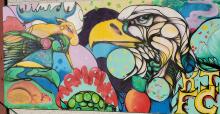 July 7, 2020
July 7, 2020I'm not from a dot on a map: language revitalization as a site for reconciliation
Image: Mique Michelle and the Mamawi Summer Camp Participants of 2018. Photo credit: Terrence Sutherland Language revitalization could serve as a site for reconciliation between Indigenous and non-Indigenous people in the town of Kapuskasing. That's according to Language Sciences affiliate…
-
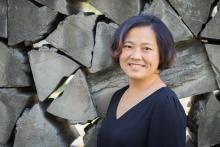 May 21, 2020
May 21, 2020Creating a safe space for heritage learners of Chinese, and helping non-heritage learners produce tricky tones
UBC's Chinese Language Program can offer a safe space for heritage learners to share similar stories and challenges, as well as an opportunity to connect with this heritage. That's according to 2019/2020 Killam Teaching Prize winner and director of the program, Dr. Qian Wang. A Language Sciences…
-
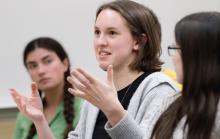 May 19, 2020
May 19, 2020Pupa versus puppies: how language can be used to manipulate and other lessons from the Living Language course
Why are invertebrates referred to as 'pests' in journal articles, but rats aren't? Why should sign language courses be offered at the university? How can non-English and non-French speakers easily access mental health services in Canada? Final projects for the Living Language: Science and…
-
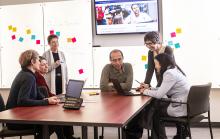
-
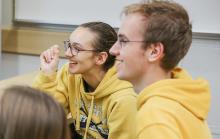 May 18, 2020
May 18, 2020Letters to Santa
Students want to take American Sign Language (ASL) classes at the University of British Columbia but many have misconceptions about sign language. That's according to a final project in the Living Language: Science and Society course, which conducted research about UBC and other universities'…
-
 May 18, 2020
May 18, 2020Emoji-based apps to aid mental health access for immigrants
How can you easily direct new immigrants to mental health services in Canada when they don't speak English or French? Enter the notOK app. A final project for the Living Language: Science and Society course, notOK aims to communicate via emojis with non-English and non-French speakers seeking…
-
 May 17, 2020
May 17, 2020Puppies versus pupa: how does stress terminology show bias in invertebrate literature?
There's probably a reason there isn't a collection jar for spiderlings at your local coffee shop. And a Living Language: Science and Society final project may have nailed why. Fourth year Land and Food Systems student Mira Macnair, studying for a degree in Applied Animal Biology, had taken a…
-
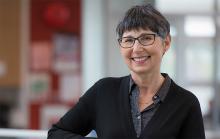
-
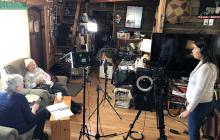 April 23, 2020
April 23, 2020Rethinking dictionaries as tools for Indigenous language reclamation
Members of the Splatsin Tsm7aksaltn dictionary team record fluent speaker, Emmeline Felix. Image credit: Aaron Leon. For half a year, Mark Turin told strangers in Nepal that he was a water well. Wanting to respond to people’s greetings with ‘I am very well’, Turin, an associate professor in…
-
 April 17, 2020
April 17, 2020Why ‘speaking moistly’ needs to be taken seriously